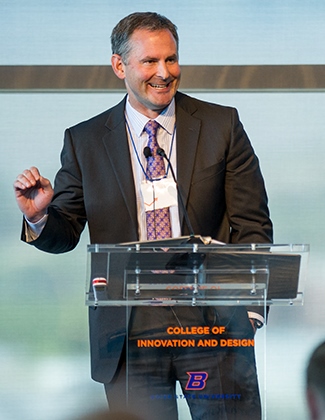You have /5 articles left.
Sign up for a free account or log in.
To hear some people tell it, in 5/10/25 years virtually all instruction is going to be delivered not by individual faculty members on thousands of campuses, but through partnerships in which most colleges use the digital courseware produced by a much smaller number of the best instructors at high-profile colleges and universities. That was the vision behind the fascination with massive open online courses, and it is how some people see the flipped classroom phenomenon ultimately playing out.
Such a vision is viewed with excitement by those who see it as a way for colleges to expand the reach of their current professors – and dread by faculty advocates who believe administrators are looking for excuses to shrink the size of their faculties.
A scenario in which the use of other institutions’ curriculums becomes the default, or even the norm, is probably unlikely. But experiments are beginning to unfold in corners of campuses around the country, and they are worth watching. One is at Boise State University, which is incorporating a Harvard Business School-created online course into its curriculum and offering up to nine Boise State credits for a year.
Gordon Jones is inaugural dean of the College of Innovation and Design at the fast-growing university in Idaho, which, like many others, struggles increasingly with state funding that doesn’t keep up with student demand. The innovation college stands apart from Boise State’s discipline-based schools, and was created specifically to develop new approaches that can be tested and, when successful, fed into the university’s other programs. 
“We prototype things, and when we think they’ve been validated, we spin them back to our discipline-based peers,” Jones says.
One of Jones’s initiatives addresses the phenomenon he sees in higher education in which “we have a wonderful way of recreating all over this industry the exact same models, and not being willing to think about how to take the best of what already exists and use it ... in ways that are not a threat but rather a multiplier of quality, that adds value for everyone,” he says.
Last fall, for the first time, Boise State integrated into its curriculum a version of HBx CORe, Harvard Business School’s business fundamentals course. HBS has long had some incoming students to take a pre-enrollment program that introduces them to the school’s famous “case study” approach and to hone their basic accounting, economics and analytics skills, and the CORe course – an asynchronous digital course – now fills that role. (Roughly a third of HBS’s incoming students now take the course either by requirement or by choice to brush up.)
The business school began offering the course to individuals for a credential through its HBx platform, and numerous liberal arts colleges have begun encouraging their students to see the credential to supplement their bachelor’s degrees.
Boise State’s Jones was intrigued by the possibility of going further. Under an experiment that began last fall (after gaining approval from the university’s faculty curriculum committee), 30 students (12 undergraduates at Boise State, the rest members of the Boise State community seeking the HBx credential) took a nine-credit course along with scores of others from around the world taking the course through HBx. Twenty more are taking it this spring, and Jones experts similar number to take it in the summer. (Boise State pays HBx a fee for each enrollee, but the university covers that amount from the normal per-credit fee students pay. The non-credit students pay Boise State more than for-credit students do.)
The core of the course was taught by HBS faculty members, but a Boise State faculty member (who now teaches in the innovation college but formerly taught in the university’s College of Business and Economics) teaches a one-credit “wraparound” lab to inject a face-to-face element – and what Jones calls “localized” content -- into the course.
“I’m still convening my 30 students into a classroom with one of our faculty members,” he says. “In an Idaho agriculture-based economy, he can add a local adaptation.” This way, he says, Boise State students are benefiting from the “global” expertise of the expert faculty members at Harvard’s world-renowned business school and the personalized knowledge of a Boise State instructor who can “explain how the content applies to the local area.”
The “local wrap is an acknowledgment that all of our faculty are bringing value,” but by having most of the credits taught by Harvard experts, Jones is creating the possibility that Boise State is “freeing its senior accounting and finance faculty” to teach higher level courses or do research “instead of teaching Accounting 101.”
Some of this is still theoretical, with the rubber still to hit the road. So far, the course has been taught only as an elective for non-majors. The expectation is that by next fall, it could be incorporated into one of Boise State’s primary colleges (likely the business and economics college) and eventually become a requirement.
At that point, Boise State will have to decide whether to use HBX CORe to replace existing sections of intro accounting or finance (with the wraparound course taught by its existing professors) and, if so, how to allocate the additional time gained by the professors who are now teaching the intro courses. 
Jones understands faculty fears that using digital courseware delivered by professors from another institution could be seen as encroaching on the expertise of – or even the need for – local instructors. “But we’re not doing this as a capacity expander, or out of the belief that we have a deficit in the teaching of the subject,” he says.
“The real payoff to the university is giving our students a chance to get a Harvard credential, and to study in a global marketplace with a cohort of 300 top students from around the world,” he says. “And the benefit for our faculty is the chance to spend their time on other things that might deliver more value,” such as research or teaching higher-level courses.
Patrick Mullane is executive director of HBx, which is responsible for delivering Harvard Business School’s business education digitally. Right now, Boise State is the only institution outside of Harvard’s continuing education school to offer the CORe course for credit; he credits the institution for thinking “creatively about ways to deliver value to their markets and stay as relevant as possible in a digital age.”
Mullane admits he is biased, but “I think more universities ought to be thinking about this sort of model, whether it’s us or not.” The future, he says, is going to involve institutions “thinking about how they integrate the in-person with the online.”





